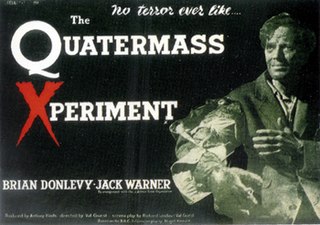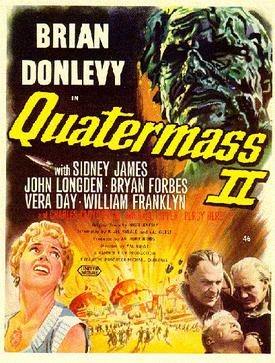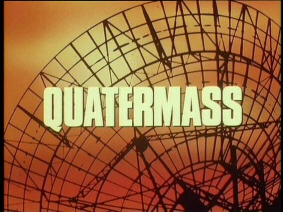
Science fiction first appeared in television programming in the late 1930s, during what is called the Golden Age of Science Fiction. Special effects and other production techniques allow creators to present a living visual image of an imaginary world not limited by the constraints of reality.
Professor Bernard Quatermass is a fictional scientist originally created by writer Nigel Kneale for BBC Television. An intelligent and highly moral British scientist, Quatermass is a pioneer of the British space programme, heading the British Experimental Rocket Group. He continually finds himself confronting sinister alien forces that threaten to destroy humanity.
Grey aliens, also referred to as Zeta Reticulans, Roswell Greys or Greys, are purported extraterrestrial beings. They are frequent subjects of close encounters and alien abduction claims. The details of such claims vary widely. That said, Greys are typically described as being human-like with small bodies, smooth, grey-colored skin; enlarged, hairless heads; and large, black eyes. The Barney and Betty Hill abduction claim, which purportedly took place in New Hampshire in 1961, popularized Grey aliens. Precursor figures have been described in science fiction and similar descriptions appeared in early accounts of the 1948 Aztec UFO hoax and later accounts of the 1947 Roswell UFO incident.

Thomas Nigel Kneale was a Manx screenwriter who wrote professionally for more than 50 years, was a winner of the Somerset Maugham Award, and was twice nominated for the BAFTA Award for Best British Screenplay.

Quatermass and the Pit is a British television science-fiction serial transmitted live by BBC Television in December 1958 and January 1959. It was the third and last of the BBC's Quatermass serials, although the chief character, Professor Bernard Quatermass, reappeared in a 1979 ITV production called Quatermass. Like its predecessors, Quatermass and the Pit was written by Nigel Kneale.

The Quatermass Experiment is a British science fiction serial broadcast by BBC Television during the summer of 1953 and re-staged by BBC Four in 2005. Set in the near future against the background of a British space programme, it tells the story of the first crewed flight into space, supervised by Professor Bernard Quatermass of the British Experimental Rocket Group.

The Quatermass Xperiment is a 1955 British science fiction horror film from Hammer Film Productions, based on the 1953 BBC Television serial The Quatermass Experiment written by Nigel Kneale. The film was produced by Anthony Hinds, directed by Val Guest, and stars Brian Donlevy as the titular Professor Bernard Quatermass and Richard Wordsworth as the tormented Carroon. Jack Warner, David King-Wood, and Margia Dean appear in co-starring roles.

Quatermass II is a British science fiction serial, originally broadcast by BBC Television in the autumn of 1955. It is the second in the Quatermass series by writer Nigel Kneale, and the oldest of those serials to survive in its entirety in the BBC archives.

Quatermass 2 is a 1957 black-and-white British science fiction horror film drama from Hammer Film Productions. It was originally released in the UK as Quatermass II and was produced by Anthony Hinds, directed by Val Guest, and stars Brian Donlevy with co-stars John Longden, Sidney James, Bryan Forbes, Vera Day, and William Franklyn. Quatermass 2 is a sequel to Hammer's earlier film The Quatermass Xperiment (1955). Like its predecessor, it is based on the BBC Television serial Quatermass II written by Nigel Kneale. Brian Donlevy reprises his role as the eponymous Professor Bernard Quatermass, making him the only actor to play the character twice in a film. It is often erroneously considered as the first film sequel to use the '2' / 'II' suffix within the title, though this distinction belongs to Sanshiro Sugata Part II.

Quatermass and the Pit is a 1967 British science fiction horror film from Hammer Film Productions. It is a sequel to the earlier Hammer films The Quatermass Xperiment and Quatermass 2. Like its predecessors, it is based on a BBC Television serial, in this case Quatermass and the Pit, written by Nigel Kneale. The storyline, largely faithful to the original television production, centres on the discovery of ancient human remains buried at the site of an extension to the London Underground called Hobbs End. More shocking discoveries lead to the involvement of the space scientist Bernard Quatermass.

Quatermass is a 1979 British television science fiction serial. Produced by Euston Films for Thames Television, it was broadcast on the ITV network in October and November 1979. Like its three predecessors, Quatermass was written by Nigel Kneale. It is the fourth and, to date, final television serial to feature the character of Professor Bernard Quatermass, this time played by John Mills.

Rudolph Cartier was an Austrian television director, filmmaker, screenwriter and producer who worked predominantly in British television, exclusively for the BBC. He is best known for his 1950s collaborations with screenwriter Nigel Kneale, most notably the Quatermass serials and their 1954 adaptation of George Orwell's dystopian novel Nineteen Eighty-Four.

"The Year of the Sex Olympics" is a 1968 television play made by the BBC and first broadcast on BBC2 as part of Theatre 625. It stars Leonard Rossiter, Tony Vogel, Suzanne Neve and Brian Cox, and was directed by Michael Elliott. The writer was Nigel Kneale, best known as the creator of Quatermass.

The Stone Tape is a 1972 British television horror drama film written by Nigel Kneale and directed by Peter Sasdy and starring Michael Bryant, Jane Asher, Michael Bates and Iain Cuthbertson. It was broadcast on BBC Two as a Christmas ghost story in 1972. Combining aspects of science fiction and horror, the story concerns a team of scientists who move into their new research facility, a renovated Victorian mansion that has a reputation for being haunted. The team investigate the phenomenon, trying to determine if the stones of the building are acting as a recording medium for past events. However, their investigations serve only to unleash a darker, more malevolent force.
Prunella Mary Gee is an English counsellor, therapist and former actress, best known for her work as an actress in the 1970s and 1980s, and for the role of Doreen Heavey in Coronation Street, a part she first played in 1999. Doreen appeared in 17 episodes before returning as a permanent character in 2002 and 2003. She came back the following year for three episodes, proving to be Gee's final television role.
Colin Abel Jeavons is a Welsh-born English retired television actor and TV presenter.
British television science fiction refers to programmes in the genre that have been produced by both the BBC and Britain's largest commercial channel, ITV. BBC's Doctor Who is listed in the Guinness Book of World Records as the longest-running science fiction television show in the world, and has been called the "most successful" science fiction series of all time.

George Anthony Haygarth was an English television, film and theatre actor.
"Message from space" is a type of "first contact" theme in science fiction. Stories of this type involve receiving an interstellar message which reveals the existence of other intelligent life in the universe.
The Road is a 1963 British television play by Nigel Kneale. It was broadcast as part of the BBC Television anthology drama series First Night. An Australian remake was aired the following year. No recordings of the production on either video or audio are known to exist. The script for The Road was published alongside those for Kneale's teleplays The Year of the Sex Olympics and The Stone Tape under the title The Year of the Sex Olympics and Other TV Plays in 1976.










